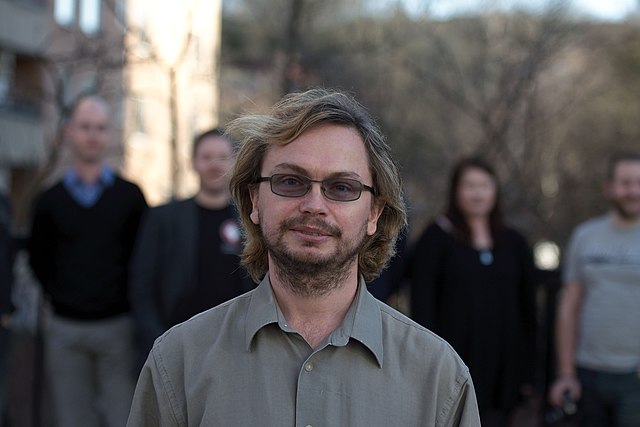You might remember Bertalan Meskó from the recent article from Nature Medicine on Medical Wikis. He’s a 22-year-old medical student at the University of Debrecen, Hungary who writes a whole lot of medical articles for Wikipedia and is the administrator of the Medicine WikiProject. He is interviewed in MedScape this week:
Med Student Helping Shape Medicine on the ‘Net
http://www.medscape.com/viewarticle/553194_print
(Free subscription may be required to view).
An excerpt:
Dr. Genes: Do you think it’s safe for doctors to use Wikipedia? Some say that it’s dangerous, since the editing is open to anyone. It’s okay if a term paper has a mistake, but not drug dosage information. Are some medical entries in Wikipedia “locked” to prevent tampering?
Bertalan Meskó: Of course it’s safe. Wiki entries are made for laymen, not doctors. If you want to know more about doses, you have to go to PubMed or Ask Dr. Wiki. That’s why I’m not worried about it.
Among the things that trouble me about Meskó’s response:
“Wiki entries” aren’t meant for anyone generally. Wikipedia entries might be intended for laypeople, but to suggest that all Wikis are intended for laypeople is not only incorrect, but contradicted by the second part of Meskó’s response. (Tangentally, I’m becoming a little frustrated with the popular misconception that a Wiki isn’t really a Wiki unless it is a completely open endeavor and intended for popular use. Wiki is a kind of Web site platform that allows multiple users to collaborate without the need for knowledge of Web markup languages.)
I don’t follow Meskó’s logic that health information in Wikipedia is harmless, even if inaccurate, because it is written for laypeople.
Meskó is right in saying that if the information seeker is looking for information about dosage, PubMed is a good place to start looking- but AskDrWiiki, until recently, had no restrictions on who could edit it, making it hardly more authoritative than Wikipedia. Would Meskó actually look to AskDrWiki for dosage information without confirming it elsewhere?
I don’t intend to disparage Meskó’s work on Wikipedia (which has been impressively voluminous and probably quite good), but his attitude towards the need for authoritative sources worries me.
There’s nothing wrong with looking to Wikipedia for an initial overview of a topic, and I routinely use it for that purpose. It can be a wonderfully handy way to start making notes for more involved research. It worries me, though, to think that anyone would STOP their research of a medical topic at Wikipedia.
I know that a handful of physicians, nurses and other clinical professionals stop by this blog now and then. If any are reading, please share your opinion: Would you recommend that your patients seek answers to their health questions with Wikipedia? Given the choice between Wikipedia and MedlinePlus, which would you sooner direct patients to (and why)? Would you think it appropriate if a colleague decided on a dosage based solely on a Wiki article editable by anyone who registered?
To readers who are not clinical professionals: How would you feel if your doctor decided on your medication dosage based on an article from a Wiki editable by anyone without checking it elsewhere?
Like this post? Subscribe to the RSS feed!
This entry was posted on Friday, March 16th, 2007 at 6:18 am and is filed under Technology, Consumer Health Info, Wikis, For Medical Libraryfolk, "Social Software". You can follow any responses to this entry through the RSS 2.0 feed. You can leave a response, or trackback from your own site.
2 Responses to “Medscape interview w/ Bertalan Meskó (Medical Wikis)”
1
Mary Carmen Says:
Wow. I mean, really, wow. Um, I hope that I never have a doctor who shares this attitude.
I don’t care how good Mesko’s writing is, the fact that he seems to think that the medical information contained in the wikipedia is safe for medical professionals to use completely invalidates every other point he makes.
And his answer regarding dosage information is also not spot on either, yes you can go to PubMed to look at articles that discuss dosing, but I can list 5 other references that I would point a physician to before telling them to go jump into the vast pool of citations that is PubMed. We need to get out of this mindset that everything needs to be readily available online for it to be of value. There are some fantastic PRINT (yeah they probably are available online too) resources where a clinician can quickly access the dosage and other information about a drug.
You ask how I would feel if my doctor based my medication dosage from information he found in a wiki article, well I would be very upset and scared. I would also feel the same way if my doctor made the decision based on a cursory search of PubMed where he/she found a small number of articles.
I feel like I am ranting, but this all comes back to the same topic that you have mentioned here before: authority. I don’t know who is writing wiki articles, just like I don’t know how proficient my physician is at searching and evaluating the medical literature. To make a clinical decision based on one or two articles is completely negligent.
I put this out there again: this is a perfect example why medical librarians are important and need to become more involved in health sciences education. We have the evaluative and search skills that clinicians need to help make treatment decisions. Evidence-based practice is important and will only work if the process of getting the evidence is a good one. Searching a wiki, no matter who writes and edits it, is not (at least at this moment in time) a good way to gather evidence.
And in answer to one of the other questions you asked, I would still, hands down always refer consumers to MedlinePlus for health information. As far as I am concerned no site has provided the amount of information, in an understandable, easy to read, in many cases multi-lingual format, as MedlinePlus has.
March 16th, 2007 at 7:58 am
2
Bertalan meskó Says:
First, thank you, David, for mentioning me. Second, I’d like to make some things clear.
The point that you and the commenter, Mary Carmen misunderstood is the question of authority. Authority must be based on references, not credentials.
In my opinion, it’s my fault if I can’t decide whether an article is reliable or not. Why? If I find a statement, data, number in the article without a proper reference, I’ll not trust that sentence even if a professor wrote that. And I trust a well-referenced article even written by a teenager.
I won’t consider an unreferenced article reliable even if it’s written by experts. So answering your concerns:
* wiki entries: we, wikipedians, don’t repeat the word Wikipedia all the time, we refer to it as wiki generally. I know well that there are many other wikis, most of them created for specialists, far not laymen. So this must be my fault for not being more clear.
* your second concern: I can’t see where I wrote that sentence, but anyway, if a Wikipedia article contains only well-referenced pieces of information which are created for laymen (I mean no doses, no medical advice…), then it must be objective, neutral and like that: harmless. That’s what we struggle to reach in Wikipedia.
* I tried to register to AskDrWiki and I had to send them and verify my credentials, my university, my studies, my achievements. So this specialized wiki can be edited just by specialists.
And at last, please never forget that I’m still only a medical student. I never said that I’m something important or my work should be seen everywhere. Brandon Keim and Nick Genes asked me to answer their questions (which was my honor).
Through my blog and my work on Wikipedia, I just try to make medicine more accessible even for laypeople. As a medstudent, I can’t see everything in its right way, that’s why I need opinions like yours now.
And the second thing we should never forget is that Wikipedia is a work in progress (
http://en.wikipedia.org/wiki/Wikipedia: ... n_progress).
I hope we can make others to think about it and many more posts on the subject will show up.
Thank you again,
Yours sincerely,
Bertalan Meskó
March 18th, 2007 at 7:49 am







